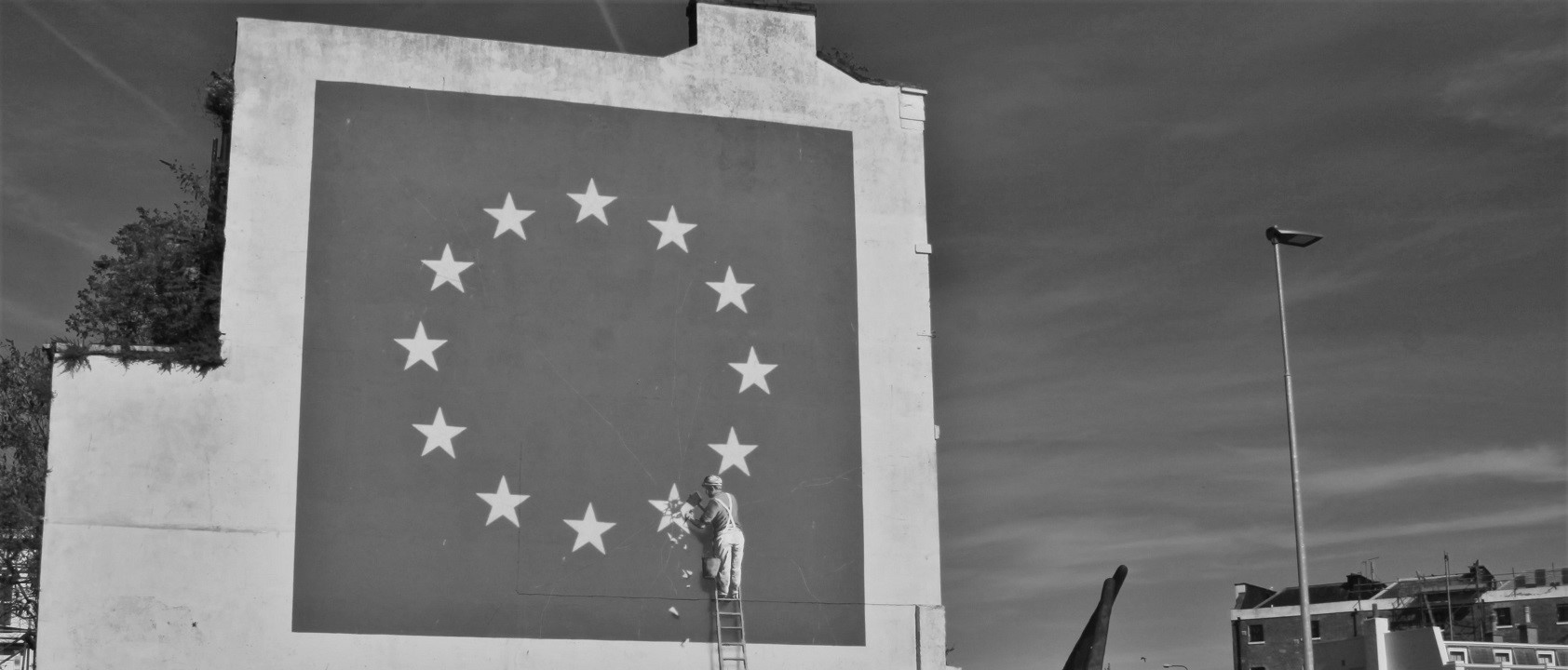Brexit's Off

Share this article
Was Banksy’s wall premature?
“[Referendums are] a device of dictators and demagogues” - Margaret Thatcher, quoting Clement Attlee.
The story behind the wall on which Banksy painted the Brexit-inspired mural in Dover in May 2017 is almost as farcical as the bungled politics that got Britain to where it is today.
In our article titled Euro Clash, written in May 2016, we imagined a world where the ‘Leavers’ won the Brexit referendum and Trump got elected. We also suggested that this would mean that the United Kingdom would become the world’s ‘leading anti-globalisation' brand.
The real point of our article was to highlight what a truly terrible job Britain’s politicians were doing in leading a debate. In fact, public satisfaction with both Theresa May and Jeremy Corbyn hit record lows over this summer.
To this day it’s not clear why David Cameron decided to call a referendum and, having done so, why he declined to learn from the Swiss and have the pass mark for change set at well above 50%.
‘Dave’ would not be the first Old Etonian Prime Minister to bodge the ‘big call’, but Anthony Eden had painkillers to blame for Suez. But maybe, just maybe, what the politicians have bungled, Britain’s bureaucrats can repair.
It was never going to be an easy negotiation. Selecting a Frenchman to negotiate a reparations treaty showed a tin ear to notable historic precedents. But then until November 2007, the Brits had the Paris to London Eurostar arriving at a station called ‘Waterloo’.
Now, after much vitriol (and the incidental self-destruction of the Conservative party for a couple of elections to come) we have a 585-page Brexit draft agreement. It suits no one.
Jeremy Corbyn (the principal beneficiary of the Boris Johnson’s repeated semi-coups), describes the deal as “26 pages of waffle”. And let’s face it, there’s a man who knows whereof he speaks.
But maybe the waffle is the genius of it. It fails to recapture our sceptred isle’s ‘sovereignty’ and is infinitely worse than our current arrangement. And so, despite the fact that there is still no concrete evidence of the logistic and economic disaster that a ‘no deal’ Brexit would be, staying put and remaining in the EU is clearly better than the plan before us.
On the other side of the table, the Europeans are experiencing their own volatilities, principally, the return of dispersion. To the astonishment of that part of the trading and investment community still at school during the 1980s and ‘90s, this term also applies to the bond market, where European rates were never meant to resemble those of Germany.
The recent spread widening of Italy over Germany to 300 basis points overlooks the significance until one pauses to consider that in the mid ‘80s the spread was 1100. And yes, Italy does in many ways resemble an emerging market economy.
So, the European negotiating position is also weaker than when we began the process. One of the largest net contributors is leaving; whilst the fourth largest economy is turning its back on any notion of fiscal rectitude.
Back to where we started. Politicians called the referendum but it is for parliament to approve and implement the result. And the majority of our lower house are in favour of staying in Europe (if only because it provides the option of lifetime’s employment if our domestic electorate fails them - witness the Kinnock family).
The British people wanted to take back power. That’s not what’s been negotiated in their name. Now, casual betrayals of European electorates' wishes are the norm, rather than the exception in matters European.
Another observation is that the form of the question influences the result and the more directly the electorate is asked to surrender sovereignty, the more resounding the “no” becomes - with France as the champions of “Non” when asked whether they wanted to adopt the EU constitution prepared under the guidance of their former President, Mr. Giscard d’Estaing.
In looking at all of this, the refrain from the quasi anthem Flower of Scotland springs to mind....” And sent him homeward, To think again,” which is usually the best case an electorate can expect. Typically, they are simply ignored.
So, why won’t that happen here? It’s now clear that any notion we had of ‘Empire 2.0’ is unlikely to work. We will struggle to recreate unilaterally the trading force of the union of which we are currently a part.
We are a small nation with a decent army and intelligence gathering apparatus. A rule of law and a language that is now the lingua mundi. But, a super power we are not. Mr. Barnier has made this beautifully, disdainfully, clear.
And all the talk about civil war if the ‘people’s will’ is ignored? Look, if the French just shrugged, rather than rushed to the barricades when a 61% no vote was ignored, are the English really going to revolt?
That’s right, it is not hard or soft Brexit. It just is not happening.
But in getting us to this point, the Conservatives have torpedoed their brand as the ‘sensible’ party, so any normalisation of sterling volatility may be short-lived. Jeremy’s coming. And gilt yields will march ever higher. But not as high as Italy’s.
Omar Ayache
Photo: © Niki Natarajan 2017
Artist: Banksy
Article for information only. All content is created and published by CdR Capital SA. The views and opinions expressed in this article are those of the author(s). Information on this website is only directed at professional, institutional or qualified investors and is not suitable for retail investors. None of the material contained on this website is intended to constitute an offer to sell, or an invitation or solicitation of an offer to buy any product or service. Nothing in this website, or article, should be construed as investment, tax, legal or other advice.
Related articles
Siren Call
The British general election campaign was strange and dystopian. Punctuated by Islamist terror attacks and almost devoid of detailed debate on economic policy, the weeks leading to 8 June were dominated by a sense of weary resignation.

Euro Clash
On Thursday June 23rd, the British people will vote on continued participation in the European Union. Does anyone truly know what they are voting for and, moreover, are those that could determine the outcome of the vote being addressed at all?

Leveraging London
London or New York? Who is asking the question and why? The average UHNWI is looking for that one special place that fills a variety of needs. Property accounts for around one fifth of their invested wealth but yield is only part of the story.



